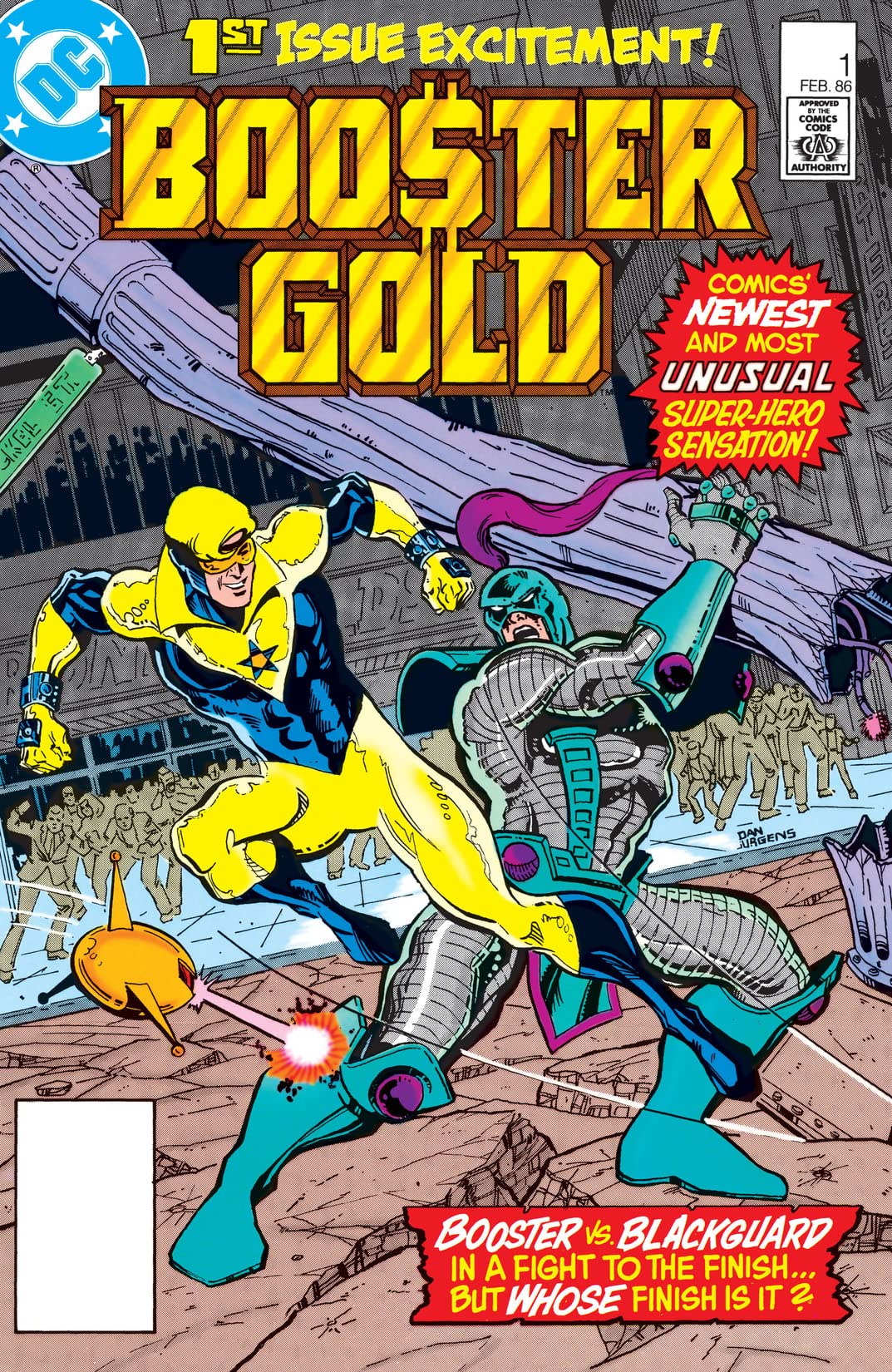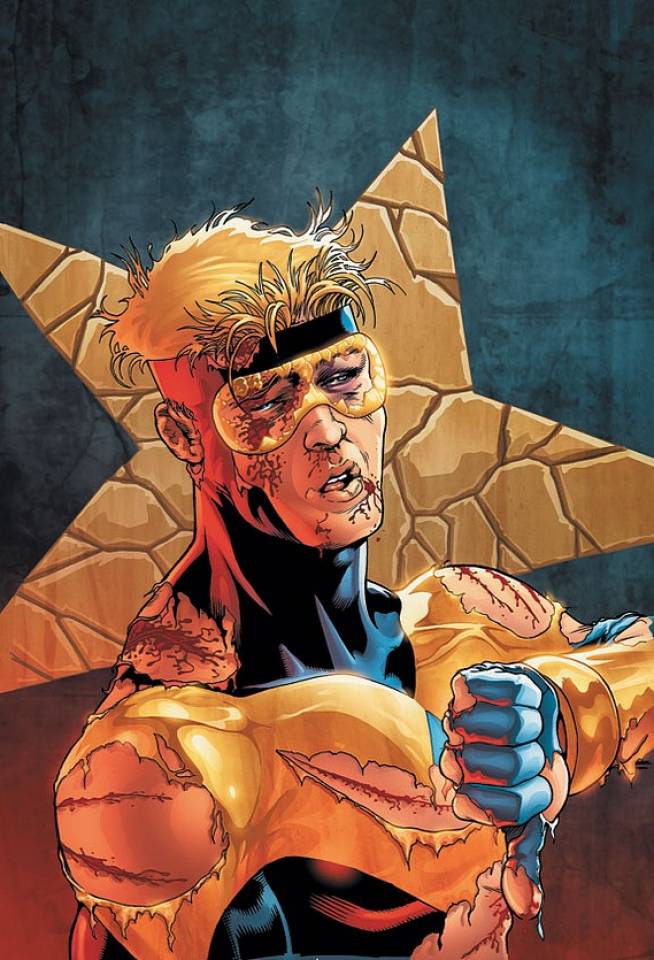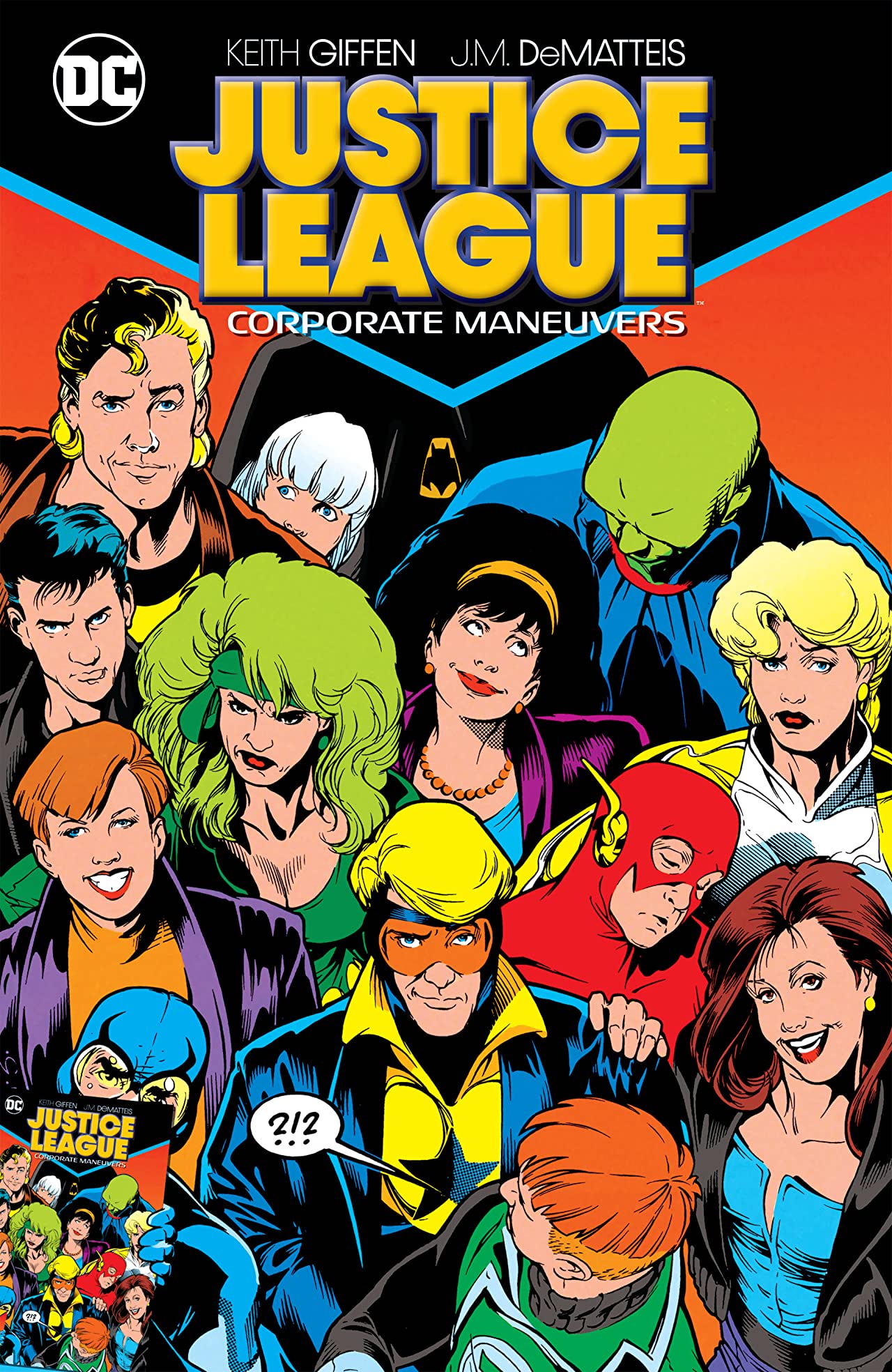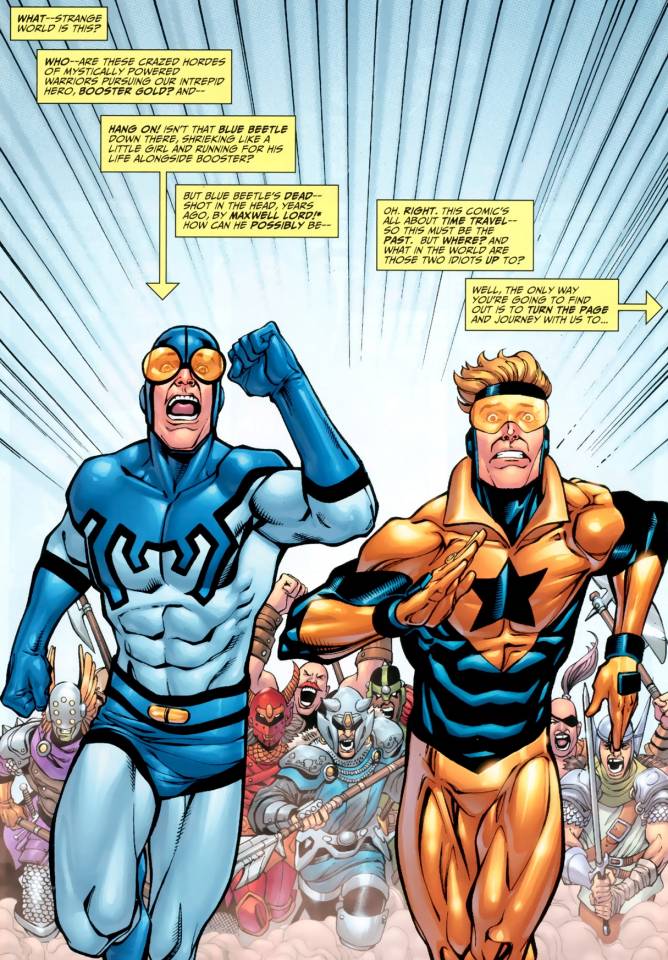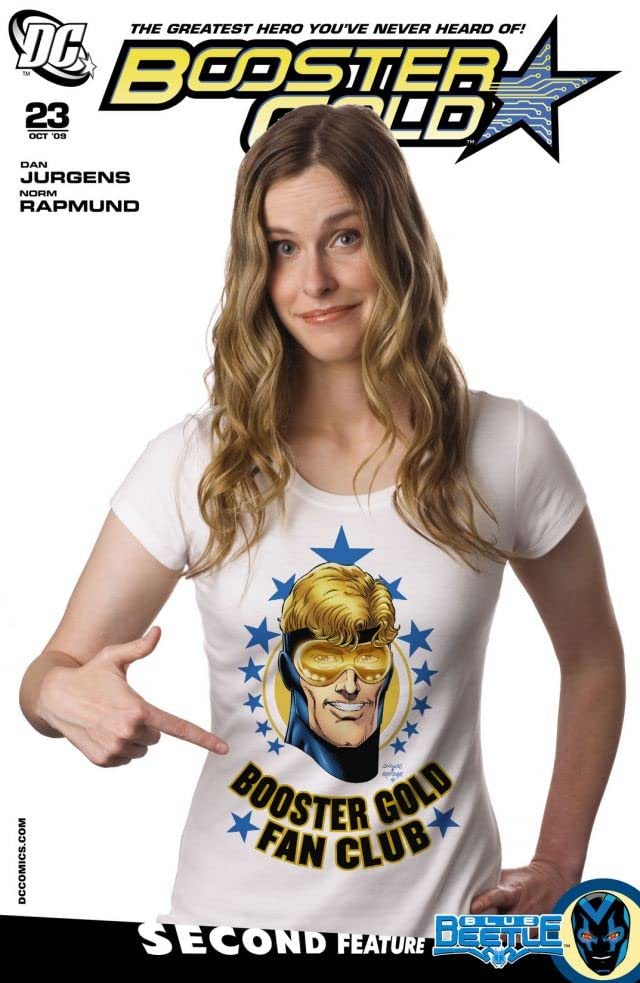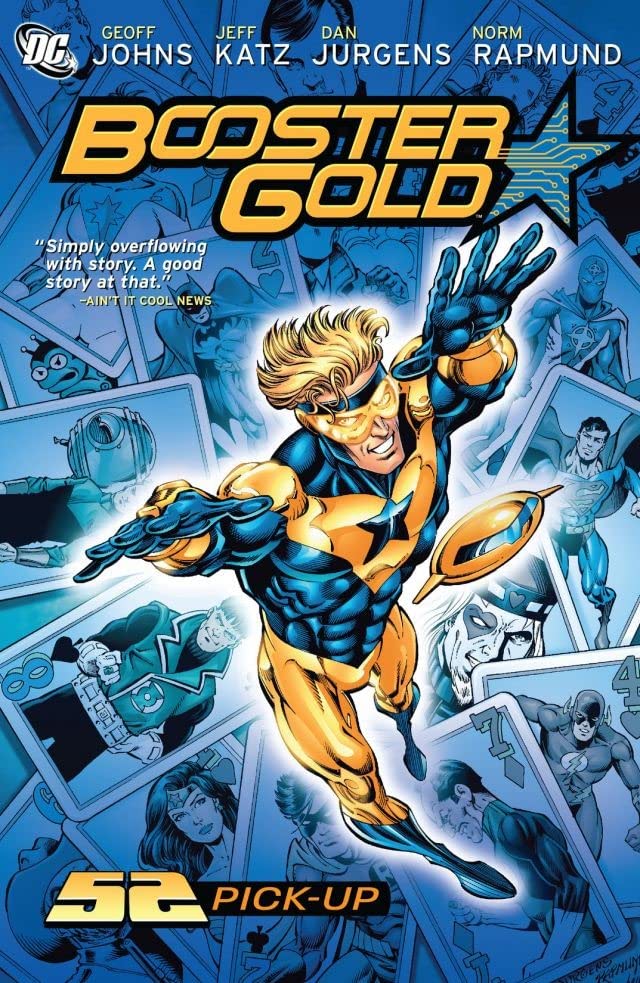Booster Gold: Inside the social media superhero who was decades ahead of his time
Learn the secret history of Booster Gold, one of the superheroes coming to the new DC Studios
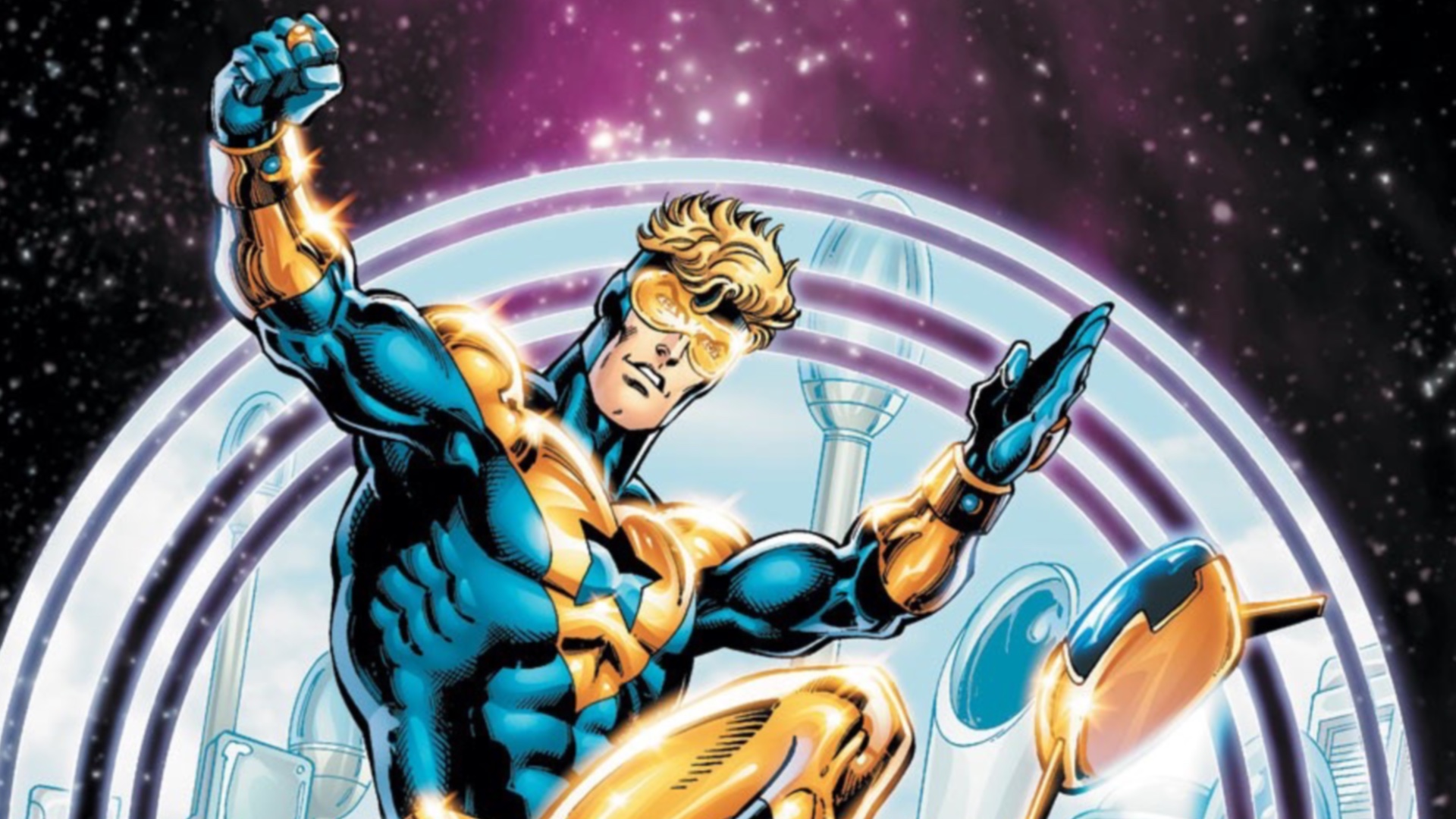
Booster Gold is everything a hero isn't supposed to be.
"I think it's pretty amazing that fans like him so much today because, if you think about the character and the way Dan [Jurgens] introduced him, he's a character you really shouldn't like, because he's so self-serving," said Keith Giffen, who has written the character several times over the years. "And even though he's learning his lessons and growing as a person, there's still a little self-serving core in there.
"But for some odd reason, fans just respond to it," he said.
Giffen's not exaggerating about that fan response. Booster Gold is one of the most surprisingly enduring characters introduced to the DCU in the last 35 years. Not only is he popular enough to co-star in his own current solo series Blue & Gold, but he was also the glue to the 2018 DC event Heroes in Crisis.
Back in the wake of Heroes in Crisis, Newsarama spoke with several of the most important creators in Booster Gold's history, including his creator Dan Jurgens, about how he came to be one of the most inadvertently ahead of his time superheroes of his era. With a Booster Gold streaming series now officially announced as part of DC Studios slate of planned projects, we're looking back at those interviews to get an insider's perspective on one of the next DC live action breakout stars.
First appearing during the '80s, Booster Gold was a 'loser' in the future, but came back in time to make himself rich and famous. He manipulated events from history to make himself a star, but even then, he wasn't especially good at what he did. Booster often made mistakes and bumbled his way through many of the original stories in the fledgling Booster Gold series that introduced him.
Yet the character was nothing if not unique.
Get the best comic news, insights, opinions, analysis and more!
Booster Gold ushered in a new DC Universe
According to his creator, writer/artist Dan Jurgens, Booster was supposed to be unique - something very different from the DC characters who had come before. After all, he was ushering in a new era for DC Comics in 1986, being among the first new characters to appear after Crisis on Infinite Earths, which rebooted the entire DC Universe.
"He was specifically designed to be different from those that already existed," Jurgens said. "Booster was meant to be much more media aware and financially driven, which, in a way, has made him even more relevant. He was specifically designed to be part of a more modern world with the traits, faults, and positives that would go along with it.
"Plus, he's always quick to crack a joke and have fun doing what he's doing," Jurgens added. "There wasn't a lot of that in the DCU."
Jeff Katz, the former Fox film executive who helped launch Booter's 2007 series with co-writer Geoff Johns, said what made Booster stand out was that his biggest fault wasn't one you had seen before in other characters.
"There were characters before him with flaws. But Booster is not only flawed, he's uniquely flawed," Katz said. "I can't think of any other characters who are overtly egotistical, or any other hero who is driven in the way he is, certainly not during the era when he was introduced and not in the regular universe. He's just got a really unique challenge to overcome as he deals with this huge drive he has to seek attention."
Booster Gold is just like the rest of us
But probably more important to the 'endurability' of Booster Gold is the fact that Booster's life feels familiar to readers, in more ways than one. "I think people relate to him as the ordinary Joe, the janitor from the future, who's making good as a superhero," Giffen said, pointing out that most comic readers wonder what it would be like to try to be a superhero.
And while other characters may deal with regular problems, Booster's problems are particularly the target of joking, giving readers the chance to look at their own lives with humor.
"To me, Booster has always been the every-man in the costume, the guy who has the same troubles in life we all have," Giffen said. "The guy who has trouble picking up girls. The guy whose schemes never pan out.
"I guess maybe they respond to somebody who is having the same problems as them and knows that if he goes out and does the right thing, it's going to cost him. But he goes out and does it anyway," Giffen said.
"He's a regular guy," agreed J.M. DeMatteis, Giffen's co-writer on most of his Booster Gold stories. "A flawed human, just like the rest of us, but thrust into extraordinary circumstances and doing his very best to get by. Sometimes his best totally sucks — but he keeps on plugging. And he does it with a sense of humor."
In fact, Giffen said that, when he and co-writer J.M. DeMatteis were told by editor Andy Helfer they had to use Booster Gold in their new Justice League run in 1987, it was this 'things-never-go-right' element that defined Booster.
"I'll be honest: I had no idea what to do with the character when we first had him," Giffen said. "Booster really didn't gel in my mind until he had the first 'bwa-ha-ha' moment and Beetle was laughing at him. I knew then that this character is going to know life's frustrations and is going to get knocked down a lot, but is always going to get back up again."
Booster Gold, Blue Beetle, and Bwa-Ha-Ha
Jurgens credits Helfer's decision to add Booster to the Justice League for making the character more than just a memory from an '80s comic.
"The juxtaposition of Booster to the other characters really helped define him, as did his friendship with Blue Beetle," Jurgens said. "It also kept him alive in the fans' eyes when his first series ended."
For a lot of comic readers today, many of whom started collecting comics when readership grew in the '80s, the Justice League starring Booster Gold is the one they remember most fondly, giving the character even more resonance into the future.
"That Giffen and DeMatteis run is the definitive Justice League run of my childhood," Katz said. "I read the stuff prior to that, but that run was very, very influential to me and a lot of other people."
One of the most enduring parts of the character's membership in the JLA was the friendship he developed with Blue Beetle, and it helped make him even more relatable, Katz said.
"In a weird way, I think they had the 'bromance' thing before people even knew what bromance was," he said. "It was really unique to comics at that time. You had Captain America and Falcon, and it was a very dry partnership, and you had Batman and Robin or any other sidekick scenario, where it was the older mentor helping a younger hero. But with Booster and Blue Beetle, it was really just friendship. That was different from what you usually saw in superhero comics. And I think there's a natural sort of affinity that comes with that.
"Those two were almost greater together than each of them were individually," Katz said.
According to DeMatteis, the friendship was something he and Giffen planned to make into a classic team. It "just evolved... they did it themselves."
As for what the teaming with Blue Beetle did for Booster's character, DeMatteis said he thinks it brought out the best - and worst - in him.
"Most important, it made him relatable," DeMatteis added. "The audience really took to those two: Blue and Gold functioned as the readers' stand-ins on the team."
Giffen agreed, saying that when readers looked at Booster and Beetle, they recognized friendships they had themselves. "Everyone's got a friend who's kind of a schemer and idea guy, who's always way more ambitious than his reach. Everybody also knows the kind of guy who tends to tag along because maybe something good will happen," Giffen said. "I think it was just the fact that they were such close friends that resonated with the fans. And also that they did stuff that was identifiable, playing jokes on one another, goofing on one another, wise-cracking back and forth, just like we do in our friendship."
Katz said the friendship also helped ground the Justice League to reality in a way that wasn't seen in a lot of mainstream superhero books.
"This was two guys who were almost like a Greek chorus," he said. "They were sitting there in the middle of the cave or watchtower or wherever they were, having the ability to comment on everything with humor, which grounded things a little and gave readers a doorway into these grand, epic stories. They're the two guys at the end of the bench on the basketball team that isn't getting in the game much, who are there for two halves of the game trying to crack each other up. In many ways, they're us."
But creators also emphasized that the humor of Booster's time on the Justice League was a key factor in why readers warmed to him so much.
"I've always been a believer that humor counts, and we went through so many periods of grim and gritty, and it feels like we've gone through at least a couple of those cycles since Booster was introduced," Katz said. "And to have a guy in the middle of that who can just make you laugh is great. You love him for it."
The evolution of Booster Gold
Despite the fact that Booster had a super-sized ego, creators have almost always given the character a heart toward doing good - turning a potential villain into something fans could stand behind.
"Even over the two years of Booster's first series, he gradually grew to be less self-centered and more heroic," Jurgens pointed out.
"He came back into the past looking for fame and fortune, for the promotion of Booster Gold, but under all of that self-serving attitude, there was a guy who really wanted to do good," Giffen said. "I don't think you put on a costume and come back into the past in order to be a superhero without at least some moral center, even if it was buried back then."
Over the years, that part of Booster has started to grow, as the character has been free to evolve into a more heroic person, teaming with his robotic friend Skeets and the time-traveling hero Rip Hunter.
"52 gave him a much greater sense of responsibility," said Giffen, who worked on layouts for the series with writers Geoff Johns, Grant Morrison, Mark Waid, and Greg Rucka. "Then DC emphasized that part of the character when Geoff and Jeff Katz started the Booster Gold series by giving him this theme of doing almost the opposite of what he came back in time to do, this selfless hero who knows he'll never get a lick of credit for anything he does."
As the original creator of the character, Jurgens emphasized that even though Booster Gold and his mission have evolved, he still retains the characteristics that were established in his original solo series.
"Geoff Johns and Jeff Katz gave him a time travel mission, but it was still very consistent with his background and ultimate destination. Too often, characters are reintroduced and immediately moved too far from their original, creative blueprint, in an effort to seem new to a new audience," Jurgens said. "Everything about Booster's origin and reason for existence is still intact. "
And in a comic book landscape that often changes continuity, Booster's evolution is something that goes seamlessly with his origins. "In that last issue [of the original Booster Gold series], we stated that Booster would evolve into a very important character in the DCU," Jurgens said. "That process is something that's still in the works and is a very clear point of direction for the character."
Besides, Jurgens said, Booster is already a very timely character, without any changes. "A character who is so media savvy as Booster, who is so willing to profit from his exploits, is, in many ways, more relevant now than in 1985," the writer said.
Katz agreed, pointing toward Twitter and Facebook as examples of self-centered use of media. "We're probably as narcissistic a culture as we've ever been," he said. "Booster Gold was ahead of the curve. He really was from the future, I think."
Booster was a big part of the 'late 80s Justice League, which is delved into with our oral history of the 1987 Justice League.
Vaneta has been a freelance writer for Newsarama for over 17 years, covering Marvel and DC, and everything in between. She also works in marketing.
